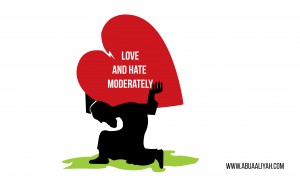Love and Hate Moderately
بسم الله الرحمن الرحيم
[powr-hit-counter id=d46a7d31_1489219344228]
There are some people who are immoderate with their emotions for their companions. It’s a fact that a person’s love or hatred for a personality is the basis for him to be excessive in either praising him or dispraising him.
Abdullah ibn Ahmed asked his father about the hadith:
” إياكم الغلو ”
“Take caution from being extreme”
Imam Ahmed said : “ Extremism exists in everything including love and hate.[1]
The Muslim must be sensible in each of his affairs. We must avoid negligence and excessiveness by loving for Allah’s Pleasure. Loving someone in hope of Allah’s reward is among the best deeds the believer can practise. The Prophet ( صلى الله عليه وسلم )said: “Neither nurse mutual hatred, nor jealousy, nor enmity, and work as fellow brothers and servants of Allah.”[2]
Not only have we been warned from being immoderate with our feelings of love and hatred but, also given wisdom about why we must be balanced with these emotions towards our fellow Muslim brothers and sisters.
عَنِ ابْنِ عُمَرَ ، قَالَ : قَالَ رَسُولُ الله صَلَّى الله عَلَيْهِ وَسَلَّمَ : أَحْبِبْ حَبِيبَكَ هَوْنًا مَا ، عَسَى أَنْ يَكُونَ بَغِيضَكَ يَوْمًا مَا ، وَأَبْغِضْ بَغِيضَكَ هَوْنًا مَا ، عَسَى أَنْ يَكُونَ حَبِيبَكَ يَوْمًا مَا
The Prophet ( صلى الله عليه وسلم )said: ‘Love the one you love in an easy manner. It may be that one day he will be the one you hate. Hate the one who hate in an easy manner, It may be that one day he will be the one you love.’[3]
- The feeling of love you have for someone should be reasonable and restrained.
- “It may be that one day he will be the one you hate.” Perhaps he will change as time passes. Your enemy might become the person you love, or the person you dislike may turn out to be your friend. If you are extreme in your love towards a person you will find difficulty in changing the way you feel about him.
- “Hate the one you hate in an easy manner” Don’t detest anyone; as the one you hate today might be the one you love tomorrow. The heart is between the two Fingers of the Most Merciful and He changes them as He wills. The conditions and situations of people constantly change, no one remains the same as they are.
- A Human-being’s nature at times makes a person unable to forgive or pardon someone, so the mood of dislike remains in his heart. This type of behavior isn’t hatred for Allah for the things He hates. Similarly, when a person doesn’t love for Allah then an unbalanced feeling lives in the heart. Anyone who loves for other than the Most Merciful will be affected with a passionate kind of love .
Allah has decreed that anyone loving someone for other than His Reward will be punished with this affection. The disbelievers love their wealth and their children more than anything else. For that reason Allah punishes them with the care for their possessions in this life and in the Hereafter they’ll be punished by everything they amassed in this World. Thus, whenever a person places the love he has for something over his love for Allah’s Pleasure then without question he will be punished with this kind of feeling. [4]
The Poet said:
حبُّ التناهي غلط خير الأمور الوسط
Loving deeply is wrong Moderation is best in all affairs
Anything that’s exceeds the limits of moderation won’t be fair and just. Allah made this Ummah a just nation that doesn’t lean towards any extremities unlike the previous generations. Some of those generations acted with thoughtlessness or were fanatical towards their Prophets. The sense of balance to loving and hating properly won’t make you derelict towards anyone.[5]
Translated and complied by :
Abu Aaliyah Abdullah ibn Dwight L Battle
Doha, Qatar 1437©
[1] Ba’da’ee Al fawa’id , by Imam Ibn Al-Qayyim (4/1412)
[2] Wasitiyah, by Shaykh Hamad Al-Uthman (p55)
[3] Adabul Mufrad , Imam Al-Bukhari (1321) graded as Hasan through other chains of reports by Shaykh Rslan (may Allah preserve him).
[4] Sharh, Al-Adab Al-Mufrad, by Shaykh Muhammad Rslan (6/4955-4958)
[5] Ibid, Shaykh Hamad Al-Uthman.




